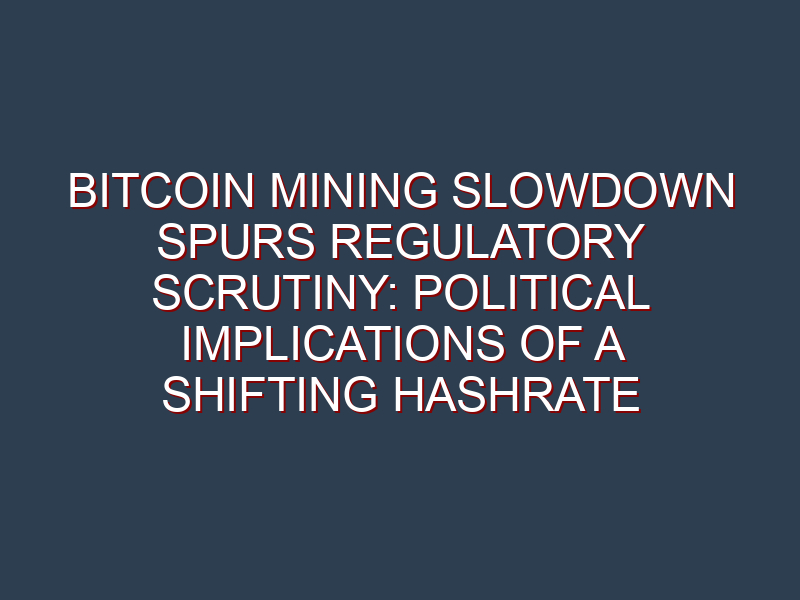Washington Watches as Bitcoin Network Hashrate Dips
The first two weeks of October brought an unusual slowdown in the Bitcoin network’s hashrate, catching the attention not only of market analysts at JPMorgan but also of regulatory agencies and political leaders who are increasingly monitoring the crypto sector’s infrastructure. When technical metrics like hashrate—a measure of the computational power securing the Bitcoin blockchain—experience noticeable shifts, Capitol Hill and federal watchdogs see more than just a blip; they see a policy challenge and an opportunity to shape the conversation around digital assets.
Regulation Catches Up to Crypto’s Energy Dynamics
The recent hashrate dip doesn’t just underline the volatility of digital currencies; it injects new urgency into ongoing debates over cryptocurrency regulation. Lawmakers and regulators have already been pushing for more oversight on crypto mining, citing concerns as broad as consumer protection, climate impact, and financial stability. The U.S. Securities and Exchange Commission (SEC) and the Commodity Futures Trading Commission (CFTC) increasingly view data points like a fluctuating hashrate as signals of market maturity— or lack thereof— spurring them to advocate for more comprehensive rulemaking that could include stricter reporting standards and operating requirements for miners.
Political Motivations: Stability, Security, and Climate Concerns
For many lawmakers, particularly those on the Financial Services Committees in both chambers of Congress, the hashrate slowdown feeds into larger political narratives about the risks of underregulated digital asset markets. Proponents of tighter rules argue that unpredictable fluctuations could threaten everything from market stability to national energy grids. The Biden administration and key Congressional Democrats have frequently cited these very concerns in calls for executive action and legislative proposals. Meanwhile, Republican leaders—often wary of overregulation—are using events like this slowdown to argue for a balanced approach that protects innovation without compromising grid reliability or national security.
For more on federal policy proposals, the U.S. Department of the Treasury maintains an evolving resource hub outlining its positions on crypto markets and mining infrastructure.
What’s Next? The Political Stakes of Crypto Market Oversight
With election cycles approaching and digital assets becoming a wedge issue, policymakers are sensitive to any technical hiccup that could justify regulatory action—or be used as political ammunition. The hashrate decline, while technical in nature, allows regulators to press their point that the market needs a more robust framework. Expect the SEC and CFTC to use these developments as further justification for new rules, while Congressional leadership faces increasing pressure from industry lobbyists and concerned constituents.
As both parties gear up for broader debates over the future of digital assets, the hashrate narrative isn’t just about Bitcoin’s technical performance—it’s shaping the next chapter of U.S. crypto policy and the balance of power between innovation and regulation.
For further reading on ongoing digital assets policy debates, visit the CFTC’s dedicated Bitcoin resource page and the SEC’s recent enforcement actions on cybersecurity.





